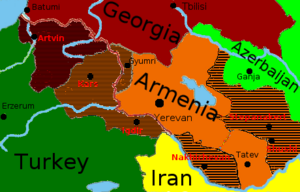This is an old revision of this page, as edited by Aivazovsky (talk | contribs) at 15:06, 27 October 2006. The present address (URL) is a permanent link to this revision, which may differ significantly from the current revision.
Revision as of 15:06, 27 October 2006 by Aivazovsky (talk | contribs)(diff) ← Previous revision | Latest revision (diff) | Newer revision → (diff)
The Treaty of Kars was a friendship treaty between Turkey and the Soviet Union. It was signed in Kars on October 23, 1921 and ratified in Yerevan on September 11, 1922. Turkey ceded Ajaria with its largest city of Batumi to the Soviet Union and the Transcaucasian SFSR in return for sovereignty over the cities of Kars and Ardahan. The treaty allowed for Turkey to assume control over parts of Russian Armenia without the consent of the Armenian people. Most of the territories ceded to Turkey were won by Russia the Russo-Turkish War of 1877–1878 with the Iğdır region (which encompassed Mount Ararat) being the only exception, as that was won by Russia in the Treaty of Turkmanchai with Iran. The treaty also effectively ended the short-lived existence of the Democratic Republic of Armenia.
After World War II, the Soviet Union attempted to annul the Kars treaty and regain its lost territory. On June 7, 1945, Soviet Foreign Minister Vyacheslav Molotov told the Turkish ambassador in Moscow that the regions should be returned to the USSR, in the name of both the Georgian and Armenian republics. Turkey found itself in a difficult position: it wanted good relations with the Soviet Union but at the same time they refused to give up the territories. Some British diplomts noted that as early as 1939, Soviet politicians might repoen the question. Turkey itself was in no condition to fight a war with the Soviet Union which had emerged as a superpower after the second world war. By the autumn of 1945, Soviet troops in the Caucasus were already assembling for a possible invasion of Turkey.
Soviet claims were put forth by the Armenians to the leaders of the Allies of World War II however opposition stemmed from British leader Winston Churchill who objected to these territorial claims as additional areas of where the Soviet government could exert its influence while President of the United States Harry S. Truman of the United States felt that matter shouldn't concern other parties.
Since independence in 1991, Armenia has refused to recognize the Kars treaty.
Notes
See also
- Aftermath of World War I
- First Republic of Armenia
- Armenian Genocide
- Caucasus Campaign
- Treaty of Sèvres
- Treaty of Lausanne
- History of Ajaria
External link
This Armenia-related article is a stub. You can help Misplaced Pages by expanding it. |
This Georgia-related article is a stub. You can help Misplaced Pages by expanding it. |
This Turkey-related article is a stub. You can help Misplaced Pages by expanding it. |